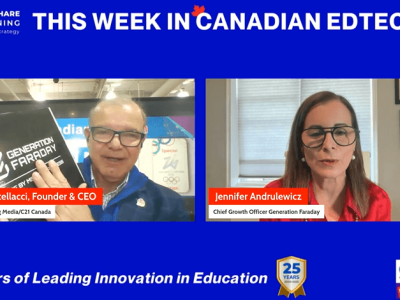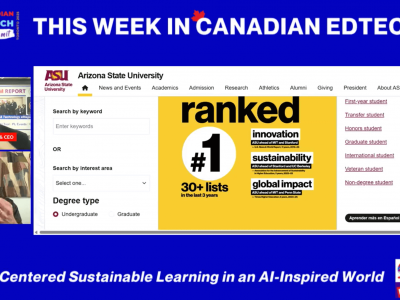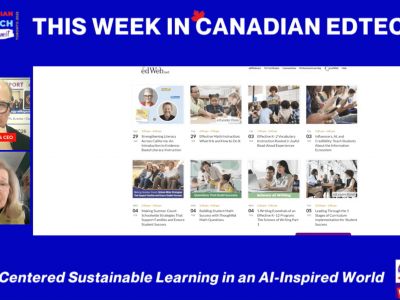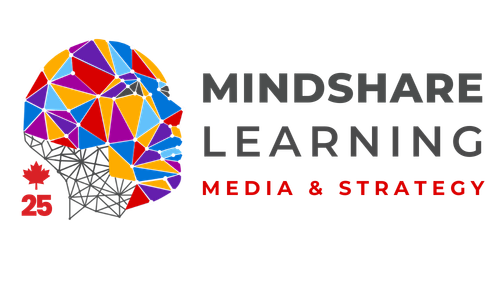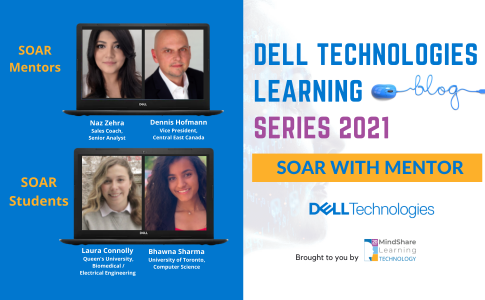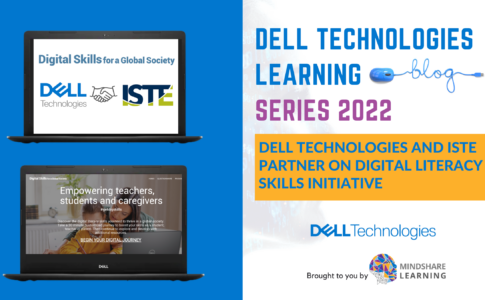We are thrilled to launch the Dell Technologies student-centred Learning Blog Series in partnership with Dell Canada and Mindshare Learning. This national collaboration will feature K12 districts/school divisions, as well as post-secondary institutions across Canada, and highlight/showcase exemplars of student-centred learning amplified by technology through an equity lens.
Stay tuned for this series of interactive and evidence-informed blogs over the course of this school year to highlight and showcase student-centered learning.
Robert Martellacci, MA EdTech
Founder & Chief Digital Publisher
MindShare Learning Report

by Dr. Ron Owston, Dean Emeritus, York University, Faculty of Education & MindShare Learning Associate
Outcomes
The teacher coaches from Toronto DSB’s McMurrich Junior Public School reported that their girls embraced the Girls Who Game (GWG) program wholeheartedly. The girls were motivated and excited to work on their challenges. The activities brought them a sense of ownership of their learning, drive, and built confidence. Moreover, they learned about STEM opportunities, engaged with female STEM role models, learned how to code in Minecraft: Education Edition, and became familiar with the UN Sustainability Goals.
A grade 6 girl is reported by one of the teachers as saying: “We built on our growing awareness of what girls can do in STEM fields. Girls who Game allowed us to build positive relationships in and out of the Minecraft world and confidence in knowing that we are change makers and can be leaders in STEM.” The parents of another girl wanted her to switch to virtual learning, however she pushed back by saying she wanted to stay with her current in-class learning community because of relationships built with GWG club members. Fortunately, by advocating for herself, the parents relented and allowed her to continue attending school in person.
The ultimate test of the success of the GWG program is if the girls want to continue having completed Level 1. Indeed, the grade 4 girls will continue with a new Level 1 challenge to build upon their design thinking, global competencies, and new skills. Furthermore, the grade 6 girls are excited to move to Level 2 to become junior mentors and join other girls across North America in leadership and support initiatives.
Game On!
Not even a shift to remote learning in January could deter the Toronto DSB’s McMurrich Junior Public School girls and teachers from forging ahead with their new gaming projects, one which went on to win the Level 1 Award for Girls Who Game this past February.
Their projects, Eatery of the Future, developed using the gaming platform Minecraft: Education Edition, were the culminating challenge of a four-month undertaking that was part of the Girls Who Game program. GWG is an extra-curricular initiative aimed at young girls to learn about gaming and develop global competencies and positive attitudes toward Science, Technology, Engineering, and Mathematics (STEM) related fields. Led by Dell Technologies, in partnership with Microsoft and Intel corporations, GWG also seeks to build capacity of educators on the integration of game-based learning into the school curriculum.
Starting up GWG
Hybrid Teacher Digital Lead Learner coach Zélia Capitão-Tavares came across the GWG program at the beginning of the 2020-2021 school year. She saw the program as an opportunity to engage girls in computer science, coding, and STEM, and help them develop leadership skills. She gained enthusiastic support from grade 4 teacher, Sebastian Basualto, and grade 6 teacher Kamla Rambaran to participate in the program. Then after gaining the necessary school support, she applied and got approval for the school to join the program.
By late October, the school received a set of laptop computers from Dell and all arrangements were in place for the program to launch.
TDSB Dell Girls Who Game Interview with Teacher Coaches
Implementing GWG
GWG has three levels: Level 1 focuses on building a community, developing global competencies such as communication, collaboration, critical thinking and problem solving, and creativity, as well and designing a solution to a real-world challenge using the basics of Minecraft: Education Edition; Level 2 features leadership development, teamwork, and esports; and Level 3 aims at improving global competencies and building an esports team. The teacher coaches at McMurrich chose to build three Level 1 teams with a mixture of grade 4 and 6 girls on each team. A total of 21 girls participated.

Guided by the inquiry-based and design thinking process, the young girls designed and developed an Eatery of the Future in Minecraft: Education Edition, which was the culminating challenge assigned to the teams by the GWG organizers. The design was based on the United Nations Sustainability Goals. After having the challenge introduced by the GWG Professional Learnig Facilitator, Karen Beutler, the clubs met twice a week over lunch. For the first eight sessions the teacher coaches led discussions on design thinking and the UN Goals. The students brainstormed on the needs of the local, national, and global community and how they could learn more about these needs. One team focused on researching the needs of a local community, another on a northern Indigenous community, while the third studied a rural community in Kenya. Female senior mentors who worked in the IT field spoke to the teams about various aspects of STEM, gave ongoing feedback and coding support, and provided STEM role models for the girls.
Once the teams sketched out their designs for their eatery, they began coding to build prototypes in Minecraft: Education Edition. For ongoing feedback and support, the teams shared their work with the rest of their classmates from time-to-time as work progressed. Because of city-wide pandemic restrictions, teams would often meet separately in their classrooms during lunch and communicate online. At the beginning of January, Toronto schools moved to only virtual learning because of the city lockdown. This didn’t deter progress as teams continued to work on their projects virtually. The GWG Professional Learning Facilitator also met with girls online to support them with coding their projects. By late January, the teams completed their culminating challenge, and their work was submitted. The team that focused on local needs won the competition.
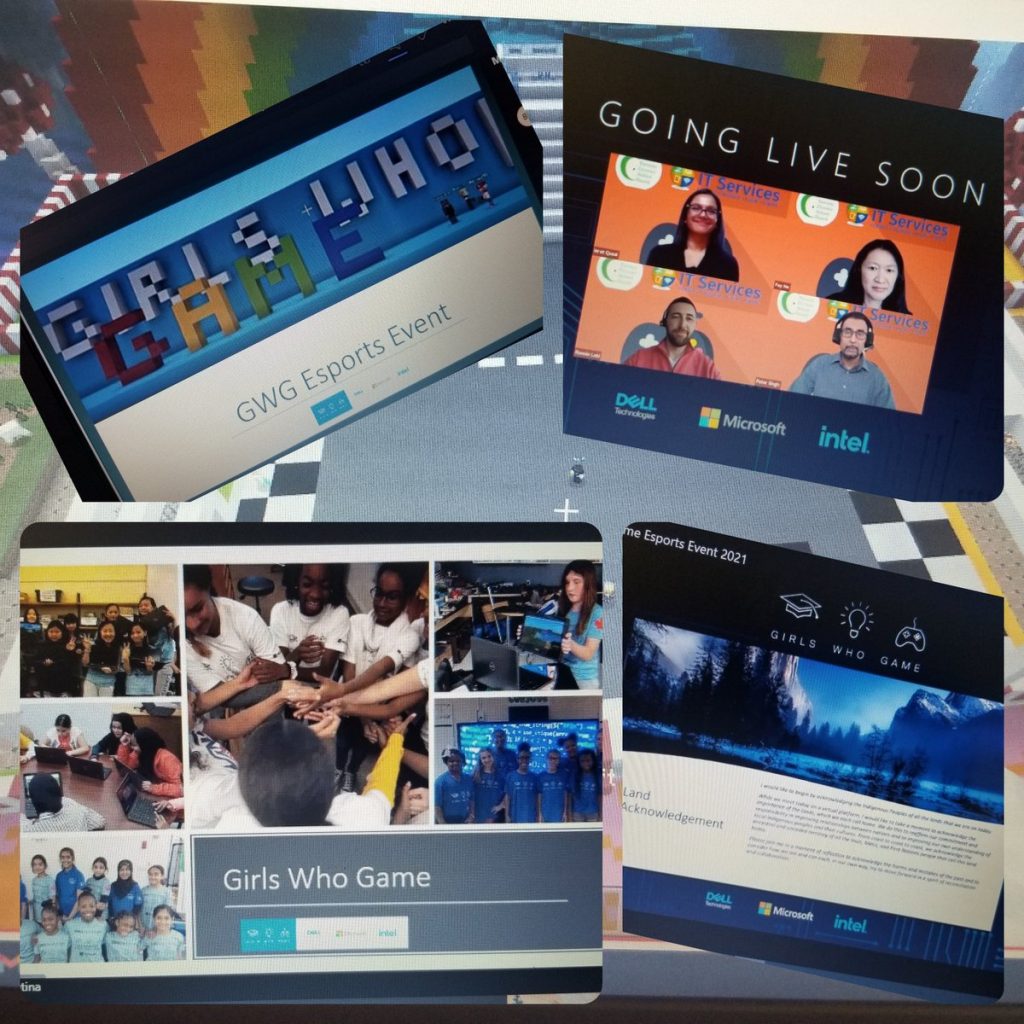
For more information about Girls Who Game – contact Canadian Education Strategist Katina_Papulkas@Dell.com or girlswhogame@Dell.com

